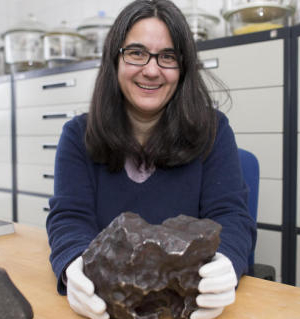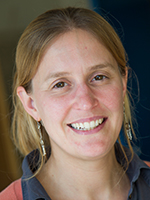 Homepage News Database Contact us
Homepage News Database Contact us

Dr. Frances Westall, CNRS-Centre de Biophysique Moléculaire, Orléans, France, a geologist by training (University of Edinburgh, UK; PhD University of Cape Town, South Africa (marine geology, sedimentology), has a background in sedimentology, biogeology (fossil bacteria, signatures of life in rocks), and planetology (habitability). She has worked in a number of European and US institutions (Alfred Wegener Institute for Polar and Marine Research, Bremerhaven, Germany; University of Nantes, France; University of Bologna, Italy; NASA-Johnson Space Center, Houston; Lunar and Planetary Institute, Houston, USA; CNRS-Orléans, France). She is a world leader in the field of fossil microbial signatures and planetary habitability (from the microbial point of view). She has an extensive background in field studies of the most ancient terrestrial terranes as well as more recent (Phanerozoic and modern) analogues. She was one of the originators of the ExoMars mission and is strongly involved in the mission definition, instrument development (co-PI CLUPI), and in the landing site selection. She is also associated scientist with MSL, and is contributing to instruments proposed for Mars 2020 (co-I). She is also PI of the International Space Analogue Rockstore, ISAR (www.isar.cnrs-orleans.fr), a collection of natural and artificial rocks and minerals that are analogues for Mars. The ISAR material is presently being used to test ChemCam on MSL as well as most of the payload instrumentation on the ExoMars Pasteur rover. She is currently president of the European Astrobiology network Association. She has over 150 publications in peer-reviewed journals, numerous book chapters and more than 250 conference abstracts. She is/has been editor of journals, such as Astrobiology, J. Sedimentological Research, Biogeology, Int. J. Astrobiology, Advances in Space Science.

Dr. Jutta Zipfel is Section leader of the Meteorite research group at Senckenberg, which has one technical staff member, students and volunteers. She has 23 years of experience in cosmochemistry and has experience in both as a researcher and, since 1997 as a curator. Her interests are in the early evolution of the Solar System, particularly the formation and differentiation of asteroidal bodies, as well as in meteorites from Mars and in the evolution of Mars. She is a member of the Athena science team for the NASA Mars Exploration Rovers. Asteroid 7565 Zipfel was named in her honour. In 2012 Dr. Zipfel was elected a fellow of the Meteoritical Society. Since 1997 Dr. Zipfel is organiser of the Paneth Kolloquium a biennial meeting entirely devoted to meteorite research. As workpackage deputy she produced reports and organised workshops on Sample Analogues.

Dr Caroline Smith, Principle Curator and Curator of Meteorites, has 16 years of experience in meteoritics both as a researcher and, since 2005, as a curator. Her main research interests are (i) the application of non-destructive/minimally invasive techniques to the study of extra-terrestrial materials and (ii) developing methods and protocols for the curation of space mission return material and meteorites. In recognition of this work, she was awarded a joint UKSA/ESA Aurora Fellowship in 2010. She has been involved in three ESA-funded industrial studies relating to sample return missions – Requirements study for a Mars Sample Return Facility; Lunar and Asteroid Receiving Facility study and Double-Walled Isolator study. In light of her considerable experience in extra-terrestrial material curation, Dr Smith will be co-coordinator of the project, responsible for overseeing its technical and scientific aspects and will oversee implantation and delivery of WP 1 (Requirements Capture and Review).

Dr. Vinciane Debaille geologist specialized in meteorite studies for understanding the formation and evolution of the solar system and terrestrial planets. She is a permanent researcher at ULB. She is closely involved in the Antarctic meteorite curation facility set-up in Belgium, and member of the Belgian curation committee, after participating to two Antarctic campaigns. She is in charge of 2 PhD students and 3 post-doctoral researchers in various domains, from the Early Earth (including meteorite-like terrestrial analogs) to asteroids. She is the PI of two major projects involving meteorites, and Co-PI of a national project ("Planet Topers") dedicated to the habitability in our solar system. She is an elected member of the European Association of Geochemistry.

Dr. Luigi Folco, a geologist by training (University of Siena, Italy) with a PhD in Planetary Science (Open University, UK), is researcher in the field of Petrography and Petrology of extra-terrestrial materials and lecturer of the Master Degree Course "Planetary Geology" at DST-Pi. He the national coordinator of the "Antarctic Meteorite Research" project within PNRA, co-P.I. of the DUSTER - Dust in the Upper Stratosphere Tracking Experiment and Retrieval within PNRA, and P.I. of the Italy-Egypt bilateral research project "Geological studies of impact craters in Egypt" funded by Italian and Egyptian Ministries of Foreign Affairs. He is author and co-author of 75 peer-reviewed scientific papers published in international journals, tens of abstracts presented at international conferences, and two book-chapters on the cosmochemistry of meteorites and micrometeorites, and the geology and geophysics of impact craters. More than 25-year experience in managing, curating and classifying large collections of meteorites, including the largest Antarctic Meteorite collection in Europe comprising 1250 meteorites and hundred-thousands of micrometeorites recovered within PNRA expeditions since 1990. Awards: 2006: International Astronomical Union, Naming asteroid (7006) Folco. 2006: Società Italiana di Mineralogia e Petrologia, Carlo Minguzzi prize for the best Italian geochemist. 2008: Scientific Committee for Antarctic Research (SCAR), nunatak in northern Victoria Land, Antarctica, named Pian delle Tectiti after the discovery of microtektites by Luigi Folco and Pierre Rochette during the 2006 PNRA expedition. Luigi Folco was co-PI of ORIGINS, Research Training Network, European Commission Framework Programme VI– Marie Curie Actions.

Dr John Bridges is Reader in Planetary Science at the Space Research Centre, Dept. of Physics and Astronomy, University of Leicester. His main research themes are early Solar System processes and the evolution of the Mars surface. He uses SEM, TEM, synchrotron techniques to analyse microsamples of asteroidal and martian meteorites and grains returned from Comet Wild2 by the Stardust Mission. This research has recently included the most detailed analyses of hydrothermal processes in the nakhlite martian meteorites (e.g. Bridges and Schwenzer, 2012; Changela and Bridges 2010), and identifying the high temperature history of some grains in Comet Wild2 (Bridges et al. 2012). His Mars research also includes being a Mars Science Laboratory Participating Scientist and ChemCam team member, characterising the fluid conditions present during the evolution of Gale Crater and at newly identified terrestrial analogue sites. His research interests include sample return, including being part of the iMars 2008, Mars Sample Return mission architecture team and UK Curation Facility studies (Bridges and Guest, 2011). John Bridges is author of more than 65 research papers published in international peer reviewed journals.

Dr. Frédéric Foucher is research engineer at the Centre National de la Recherche Scientifique (CNRS), in the exobiology team of the Centre de Biophysique Moléculaire (CBM), in Orléans, France. He obtained his Ph.D. in physics at the University of Poitiers, France, in 2007 and continued his studies and research at the CBM as a specialist of Atomic Force Microscopy then of Raman spectrosco-py. He is now working in various fields of astrobiology: Martian exploration, space analogues, primitive Earth, biosignatures and instrumentation.
Katherine Joy (University of Manchester), Martin Lee (University of Glasgow), Jesus Martinez Frias (Madrid), Joe Michalski (NHM, London), Penny Wozniakiewicz (NHM, London).